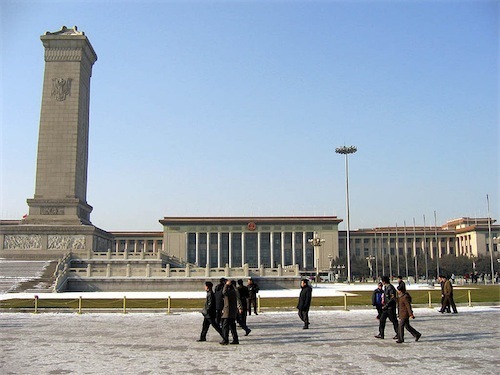Across the Sea
Suppose Hu Jintao stood before the National People's Congress last night and delivered a long speech about national priorities that was overwhelmingly dedicated to domestic issues. Basically, Hu is talking about things that he believes will enhance China's economic growth great—ideas about better schools, better roads, scientific research, tweaking the tax code, etc. It's all pretty benign. Except there's something weird about the speech. Instead of saying that the main reason to do this is that it will slightly increase the rate at which Chinese people improve their material living standards, he says that "the global competition for jobs is real" and the purpose of school reform is to "win the future," topple American hegemony, and overawe India despite the latter's larger and faster growing population.
The Great Hall of the People
Hu then observes that historically China has been the world's most powerful state, that he looks on the past 150 years of non-dominance as an essentially transient phenomenon when you take the broad view. He says that the Han people are exceptional and through the same grit and determination that they used to shake off the Japanese yoke and tame the wild west of Tibet will continue their upward march. Then he briefly pivots to an overview of China's main national security objectives—reunification with Taiwan, etc.
People would find that . . . odd . . . right? And kind of distressing.
I was at an event this morning with Anne-Marie Slaughter, Director of Policy Planning at the State Department who assured me that the US government doesn't see the world in terms of 19th century power politics, but does worry that some elements of some foreign governments do see the world in those outmoded terms.


Matthew Yglesias's Blog
- Matthew Yglesias's profile
- 72 followers




